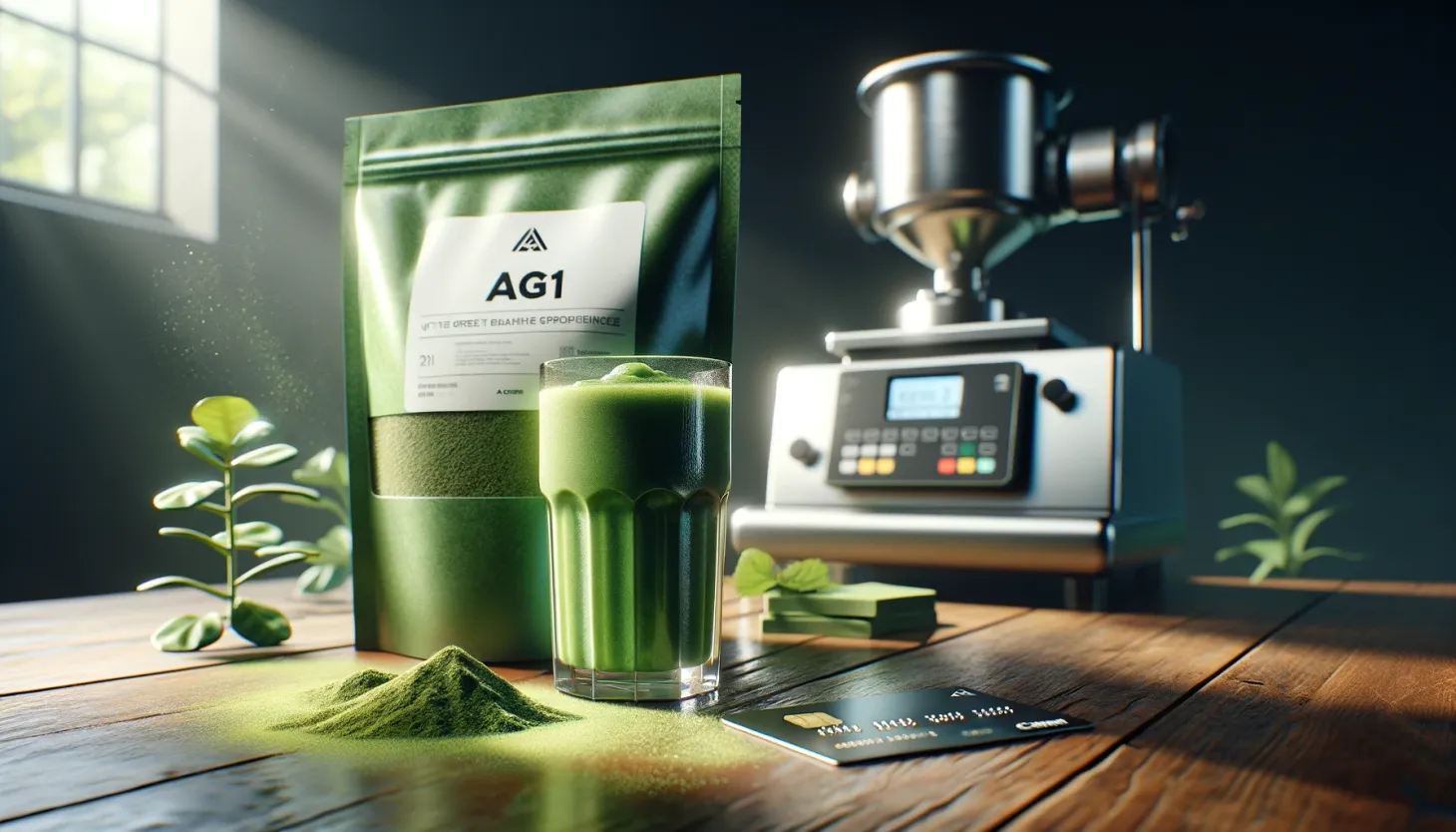🌿 IG#32: The Self-Fulfilling Prophecy of Athletic Greens
How a brilliant marketing ploy gets thousands of people to consume a drink that tastes like taking a bite out of a soccer field.

If you’ve listened to a podcast in the last twelve months, you’ve heard this line:
“This podcast is brought to you by Athletic Greens. It’s my one-stop-shop for all my nutritional needs that ensures I cover all my bases. […]”
Andrew Huberman.
Tim Ferriss.
Steven Bartlett.
Chris Williamson.
All my favourite podcasters promote it.
And there’s a good reason why.
(Hint: it’s not the product.)
In this post, I want to take a deeper look at the absolute masterclass Athletic Greens is doing in marketing, and how it plays to our deepest desires.
Let’s dive in. 🤿
[1] What’s AG1?
AG1 is the product made by Athletic Greens: a green powder that contains 70+ ingredients. It’s supposed to increase mental fitness, give you energy, heal your cells (what does that even mean?), and improve your immune system.
I’ve tried it a few times, without a noticeable difference.
Kind of tastes like taking a bite out of a soccer field, and makes your stomach feel funky.
That’s all the context you need.
I’m not a nutritional or fitness expert, so I won’t review whether AG1 works or not.
There are plenty of people on YouTube who can do this better than I can.
What I’m interested in is the marketing behind AG1. ⬇️
[2] Athletic Greens’ secret business sauce
AG1 comes at the apparently “inexpensive” price of “only” $2.49 per serving.
“Less than a cup of coffee.”
Yeah, fuck that logic.
AG1 is a whopping $99 (€87) for a 360g pouch of green powder!
That renews every single month!
Why do thousands of people still buy it?
- Brilliant Marketing
- Psychology
At this price point, you have a ton of money left over for promotion.
Athletic Greens is a D2C company. You can’t buy their stuff on Amazon, at the store, or elsewhere - just on their own website.
They ensure people get there by using affiliate marketing.
I looked into their commission schemes for affiliates. Results range from 20% - 50% lifetime commission. [1, 2, 3]
On Every. Single. Sale.
Let’s take Tim Ferriss. He’s been promoting AG1 for ages, with his podcast ranked #1 on many occasions. He may have crossed the 1B downloads threshold already.
This probably puts him at the high end of the commission range, so 50%.
Tim guarantees his advertisers 750k downloads per episode (according to this highly questionable source on Quora, but let’s roll with it).
Now, even if only 0.1% of these downloads convert to AG1, this means that 750 people buy AG1 through his affiliate link.
Which would earn him: 750 * $50 = $37.500 in commissions.
Every. Single. Month.
Now, Tim releases 1-2 episodes per week.
So by promoting AG1, he can make 4 * $37.5k = $150k in monthly recurring revenue every single month!
SaaS startups dream of these kind of numbers.
And remember, this is just from promoting AG1, not taking into account any other sponsorships.
Tim is incentivised to promote AG1 like crazy.
AG1 can afford to incentivise him - and all the other podcasters - like that because of their equally crazy margins.
So that now, we hear about AG1 everywhere.
If Tim Ferriss AND Andrew Huberman AND Chris Williamson AND Steven Bartlett use it, it must be good - right?
Not necessarily - they’re just incentivised like crazy to promote it.
But that’s what we think.
Here’s what happens next:
- We hear about AG1 over and over again
- Curious, we buy it - the price seems hefty, but there must be something to it if everybody is promoting and using it
- (I mean, c’mon, Andrew Huberman, the self-optimisation PhD uses it!)
- We buy a tiny 360g pouch of green powder for $99
- Since we just dropped an unreasonable amount of money on this, we convince ourselves that it indeed feels good
- If our friends ask about it, we - of course - tell them that it works
- (After all, would you really want to admit that you just dropped $99 on green powder that’s simply placebo? You’d look hella stupid)
- Our friends see all their friends using it and saying good things, so they start using it too
- And our favourite podcasters and Athletic Greens benefit from it
Is this our newest pyramid scheme?
Kind of.
But more so, it reminds me of the tale of the Emperor’s New Clothes.
Everybody pretends to like AG1, because they don’t want to look stupid.
Depending on how long they’ve been using it, it may even have become a part of their identity.
If AG1 has become part of their identity, expect biased advice.
Don’t ask a barber if you need a haircut.
Fortunately, there are plenty of people out there calling out AG1 for what it is - a fitness supplement that you likely wouldn’t need if you “ate real food”.
(One of them is James Smith, whose video inspired this post.)
This newsletter is brought to you by … Athletic Greens!
Click this link to get a FIVE FREE TRAVEL PACKS, A FREE YEAR’S SUPPLY OF VITAMIN D, AND A SHAKER.
(just kidding - although I wouldn’t mind a cool extra $37.5k per month per newsletter)
[3] 💊 The Magic Pill
Besides its brilliant marketing strategy, AG1 also plays to our deepest desire: the “magic pill” that you take, and you’ll instantly be healthier.
The magic pill doesn’t exist. There are no biological free lunches.
While AG1 may certainly have benefits, you’d likely get similar benefits from eating a well-balanced diet.
AG1 might even have an adverse effect: if you take it daily, you might think that since you’ve already had your greens, you don’t need to eat your vegetables anymore.
But whole food > processed food, any day of the week.
The only use case that I see is while traveling: when you don’t have access to healthy food (eg. At airports or at conferences), AG1 might be a solid supplement. Daily? I’d much rather just drink my smoothies and eat my fruits and veggies.
AG1 goes to show how much we’d be willing to pay for said magic pill: $99 per month.
That’s insane. For this kind of money, you could:
- Get a high-end gym membership (this is what you get for $99 in Berlin)
- Get a personal training session
- Save for 12 months and buy a premium mattress
- Get a massage or physiotherapy twice a month
- Buy most of my sports tool stack and still have money left over
So take AG1 for what it is: a supplement that probably won’t hurt you, and in some scenarios might help you.
But at what cost?
I’d much rather spend that money elsewhere.
Who are you going to be?
(A) The best version of yourself?
(B) Or yet another victim to a brilliant marketing ploy promising a magic pill?
To unlocking our potential. 🔓
LFG 🤝
Dominik
One ask from my side
Building an audience is hard. And it’s even harder if you don’t ask for favours. So let me ask you for one:
If you’ve been subscribed for a while, and are getting value out of this publication, please tell a friend.
Helps everyone:
- Your friend gets a bi-weekly dose of systems and philosophies to unlock their potential
- You receive social capital for being an early reader
- This publication grows
If you keep reading, I’ll keep writing.
Click the button below, or simply forward them this email. 👇
If you’re into supplementation & marketing, I wrote a newsletter with nuggets on both topics. Read it next:
International Generalist #4: Four-Day Workweek, Vitamin D, Pricing & Scalable Acquisition Channels
Dominik Nitsch • Feb 20, 2023

Welcome to International Generalist, a newsletter about all things startups, health and becoming a more effective person. Today, we’ll cover: What many people are getting wrong about the four-day workweek A vitamin D experiment that has helped me feel much better
Read full story →
Whenever you’re ready, here’s how else I can help you:
- Read the newsletter archive for more actionable nuggets
- Download your free copy of The Ultimate Guide to Time Management (how to reclaim 4 hours of your day)
- Connect on LinkedIn or Twitter for daily doses of insights
- Send me a question that you’re thinking about! I’m always looking for content that is relevant to YOU.
Dominik Nitsch Newsletter
Join the newsletter to receive the latest updates in your inbox.


